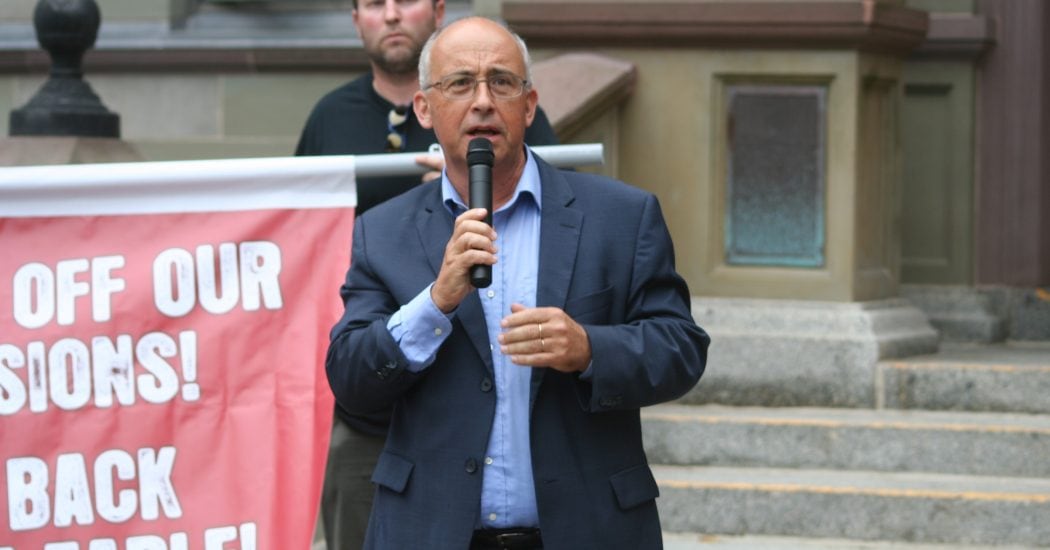
KJIPUKTUK (Halifax) – Last week (and well before last weekend’s mass shooting) we talked with NDP Leader Gary Burrill, about being a progressive party in opposition during a crisis, what COVID-19 reveals about the state of the province, and how to oppose the push for more austerity that will occur once the crisis is over.
In terms of policies what is the provincial NDP focusing on at this time?
We have mostly been talking about the need to stop evictions, lower power and internet bills, and have paid sick days.
To start with paid sick days. Shortly before COVID-19 arrived in the province, and while everybody knew what was coming, the NDP called for a move to a system of paid sick leave in the province. I think the government missed the boat. It was the perfect moment to bring that about.
When the pandemic struck full force in Canada, one of the first places it seriously affected was a nursing home in Vancouver. It’s been subsequently determined that the worker through whom the virus was originally carried there was someone who was not feeling well that day. That person had already used up their very limited entitlement to paid sick leave, and so they felt that not going on the shift was unaffordable.
Secondly, about evictions, we were already in a situation of unprecedented tightness of the rental market, and there were already all kinds of evictions because of the many sudden spikes in people’s rents. Therefore, in a pandemic the first thing was to make sure that all those evictions stopped. The government did implement an eviction ban, which is to their credit, but they did it in a limited way. Their ban on evictions only applies to situations where the tenants’ income is affected by the pandemic.
Thirdly, we hear the government saying that while staying home we need to find other ways to connect. In order to make that achievable there are several things the government needs to see to. High on that list is a freeze on all rent increases. We are also asking for a ban on cutting off people’s cell phone or internet services. And we want power rates to be lowered, as people are home more while facing increased costs altogether.
In a recent Chronicle Herald story you talk about how the familiar and critical role of opposition political leaders shifts in times of great emergencies that require a united approach.
Meanwhile the NDP has been relatively silent on issues where activists and people directly affected could have benefitted from your office’s ability to amplify their voices. I am thinking of things like the premier’s scolding of the people in the Prestons, the aggressive policing and high fines for contravening social distancing regulations, front line workers not receiving proper safety gear, the lack of support for people on social assistance….
Every one of the points you raise are worthy of being raised. But I do think that in a national emergency our job becomes to focus on where we can secure improvements and advancements to the work that the government is doing, as opposed to the sometimes more narrowly partisan discourse that is often part of our responsibility. That’s not a shift in path, it is a difference in emphasis.
Very early in this crisis we proposed to the government that we set up an all party briefing table. All these issues you mention we have been pressing every day at that table. Some to greater effect than others.
These two fronts of proceeding, publicly and cooperatively behind the scenes, have always existed. Under normal circumstances the public part is more prominent, but in these times the part of our work that takes place on a nonpartisan basis needs to be greater. That’s not to say that any of the issues that you’ve mentioned ought not to be part of our public discourse.
Note that the term partisan is actually a very fine and honorable word. I use it here in the negative sense that the word has acquired in our culture, as engaging in narrowly partisan politicking. People are in general hungry for a politics that is not narrow, manipulative, strident. They are quite right in a moment of societal threat to have less patience. for that.
To me the current crisis is a perfect teaching moment. It is becoming very obvious how the damage of decades of austerity politics makes dealing with the fall out of the pandemic so much harder.
In a structurally unequal society like ours, ideology always functions to hide a lot of things that people are at some other level well aware of. During a situation of sharp crisis things which have been problematic all along are now revealed in their full troublesomeness.
For instance, the scandal of people not having a home to live in has at some level become more on the public mind in a situation where social distancing is important. Similarly, the impossibility of living on $789 a month, as people are forced to do by our miserable income assistance system, is brought into public view in a sharper way when the federal government says people have got to be able to live during this crisis, let’s get them a check for $2000 a month immediately. Or the fact that some people in our society are lucky enough to stay at home when they’re sick and get paid while many more people have to engage in this terrible calculus of not feeling well but having to go to work just the same that because they won’t get paid if they don’t.
I think the COVID-19 crisis has been bringing a new lens to viewing the structural unfairness and inequality in society. It is leading people to see things in a clearer, truer way. We can only hope that this is something that will persist and will be a force for justice in the future.
We’ve lived through this long neoliberal period when it was considered that only the private sector and the individual entrepreneur has real dynamism. In fact, in the present situation no one is turning to the private sector, no one is turning to successful investors to deal with this great peril. Instead people are turning to, of all things, the government, the public sector, and our communities. The same components of our lives, which have been denigrated, and diminished in a heightened way during the last half century of capitalism.
How might things unfold from here. It took the Chronicle Herald only a week to warn that once this crisis is over we will need to turn once again to austerity, only this time it must be austerity on steroids. Is that what awaits us?
I can tell you what I hope. When we look back at the 1930s, the way out of the Great Depression was paved by massive investment in public life by the public sector, by an activist interventionist state, supporting and advancing the incomes of working people. This led to the whole wonderful plethora of Keynesian interventions in the economy, pensions, Medicare, EI, all of that.
Now, my point is that these Keynesian interventions were not immediately reversed after the war. That genie did not go back in the bottle. Why was that? The reason is a highly organized movement of the working class and the popular classes, a big component of which was the precursor of the NDP tradition, the CCF.
From my point of view a moment like this one places a great emphasis on the strength and organizing capacity of the left and, critically within that, the NDP. We have this moment when the activist state is emerging in a way that it has not for 40 years. As you’ve said, there will be a major push within a few months from the neoliberal forces to get this genie back in the bottle. And we know that the primary force for good to keep that from happening is the organized political strength and capacity of the left.
With a special thanks to our generous donors who make publication of the Nova Scotia Advocate possible.
Subscribe to the Nova Scotia Advocate weekly digest and never miss an article again. It’s free!



